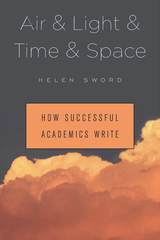
From the author of Stylish Academic Writing comes an essential new guide for writers aspiring to become more productive and take greater pleasure in their craft. Helen Sword interviewed one hundred academics worldwide about their writing background and practices. Relatively few were trained as writers, she found, and yet all have developed strategies to thrive in their publish-or-perish environment.
So how do these successful academics write, and where do they find the “air and light and time and space,” in the words of poet Charles Bukowski, to get their writing done? What are their formative experiences, their daily routines, their habits of mind? How do they summon up the courage to take intellectual risks and the resilience to deal with rejection?
Sword identifies four cornerstones that anchor any successful writing practice: Behavioral habits of discipline and persistence; Artisanal habits of craftsmanship and care; Social habits of collegiality and collaboration; and Emotional habits of positivity and pleasure. Building on this “BASE,” she illuminates the emotional complexity of the writing process and exposes the lack of writing support typically available to early-career academics. She also lays to rest the myth that academics must produce safe, conventional prose or risk professional failure. The successful writers profiled here tell stories of intellectual passions indulged, disciplinary conventions subverted, and risk-taking rewarded. Grounded in empirical research and focused on sustainable change, Air & Light & Time & Space offers a customizable blueprint for refreshing personal habits and creating a collegial environment where all writers can flourish.
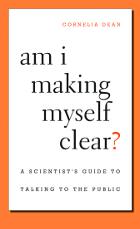
What we don’t know can hurt us—and does so every day. Climate change, health care policy, weapons of mass destruction, an aging infrastructure, stem cell research, endangered species, space exploration—all affect our lives as citizens and human beings in practical and profound ways. But unless we understand the science behind these issues, we cannot make reasonable decisions—and worse, we are susceptible to propaganda cloaked in scientific rhetoric.
To convey the facts, this book suggests, scientists must take a more active role in making their work accessible to the media, and thus to the public. In Am I Making Myself Clear? Cornelia Dean, a distinguished science editor and reporter, urges scientists to overcome their institutional reticence and let their voices be heard beyond the forum of scholarly publication. By offering useful hints for improving their interactions with policymakers, the public, and her fellow journalists, Dean aims to change the attitude of scientists who scorn the mass media as an arena where important work is too often misrepresented or hyped. Even more important, she seeks to convince them of the value and urgency of communicating to the public.
Am I Making Myself Clear? shows scientists how to speak to the public, handle the media, and describe their work to a lay audience on paper, online, and over the airwaves. It is a book that will improve the tone and content of debate over critical issues and will serve the interests of science and society.
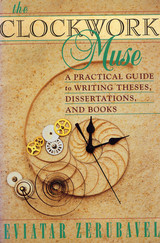
For anyone who has blanched at the uphill prospect of finishing a long piece of writing, this book holds out something more practical than hope: it offers a plan. The Clockwork Muse is designed to help prospective authors develop a workable timetable for completing long and often formidable projects.
The idea of dashing off a manuscript in a fit of manic inspiration may be romantic, but it is not particularly practical. Instead, Eviatar Zerubavel, a prolific and successful author, describes how to set up a writing schedule and regular work habits that will take most of the anxiety and procrastination out of long-term writing, and even make it enjoyable. The dreaded ‘writer’s block’ often turns out to be simply a need for a better grasp of the temporal organization of work.
The Clockwork Muse rethinks the writing process in terms of time and organization. It offers writers a simple yet comprehensive framework that considers such variables as when to write, for how long, and how often, while keeping a sense of momentum throughout the entire project. It shows how to set priorities, balance ideals against constraints, and find the ideal time to write. For all those whose writing has languished, waiting for the “right moment,” The Clockwork Muse announces that the moment has arrived.
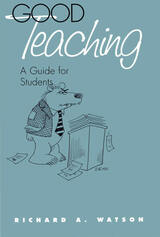
From junior college to Ivy League university, the level of teaching ranges from "great to awful," according to Richard A. Watson, who explains not only how to survive but how to profit from and enjoy your college experience.
To help students make important personal choices—what school? what major? what classes?—Watson explains such broad areas as administrative structure, institutional goals, and faculty aspirations.
Charging the student with the ultimate responsibility for learning, Watson presents certain academic facts of life: teaching is not the primary concern of either the faculty or the administration in most institutions; few professors on the university level have had any training in teaching, and even fewer started out with teaching as their goal; senior professors do not teach much (the higher the rank and salary, the less time in the classroom), and those seeking tenure must emphasize research to survive; and almost certainly, the bad teacher who is a good researcher will get paid more than the good teacher who does not publish.
This is a book about good teaching and how to find it. Rejecting the conventional wisdom that a professor devoted to research will not be effective in the classroom, Watson advises that you take classes from the professor you may have been cautioned to avoid.
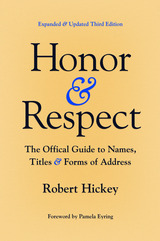
For any personal or professional situation where formality is of the essence and proper decorum is the expectation, this book offers critical information on how to address, introduce, and communicate with officials, functionaries, and dignitaries from all walks of life. From presidents to pastors, ambassadors to attorneys general to your local alderperson, Honor and Respect offers clear explanations and examples of the official honorifics of thousands of federal, state, and municipal officials; corporate executives; clergy; tribal officials; and members of the armed services in the United States, Australia, Canada, and the United Kingdom. It also includes titles and guidance on addressing high officials from more than 180 countries.
This updated third edition reflects the nuanced changes in language, protocol, and conventions that have been implemented by the State Department, Armed Forces, and myriad other government offices in the United States and beyond. With its all-encompassing scope and quick-reference format, Honor and Respect provides easy access for all who seek the proper protocols of forms of address. This book is an indispensable reference for individuals and offices working in government, foreign affairs, diplomacy, law, the military, training and consulting, and public relations, among others.

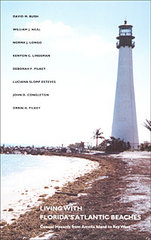
From Amelia Island just south of Georgia to Key West's southern tip, beaches are one of Florida's greatest assets. Yet these beaches are in danger: rapid structural development on a highly erodible coast make them vulnerable to some of nature's greatest storms. The same development that has been driven by the attraction of beautiful beaches and coastal amenities now threatens those very resources. In turn, coastal structures are at risk from sea-level rise, shoreline retreat, winter storms, and hurricanes. Most of the methods for reducing losses associated with storms protect property only in the short term—at a growing cost in dollars and loss of natural habitat in the long term.
Living with Florida's Atlantic Beaches is a guide to mitigating or reducing losses of property, human life, and natural resources by living with, rather than just at, the shore. This illustrated volume provides an introduction to coastal processes and geology as well as a brief history of coastal hazards and short-sighted human responses. This is the first volume in the Living with the Shore series to discuss the significant long-term impact of dredge-and-fill beach construction on living marine resources. Guidance is provided for long-term risk reduction in the form of tips on storm-resistant construction and site evaluation; maps for evaluating relative vulnerability to hazards are also included. A brief review of coastal regulations will help property owners understand and navigate the various permit requirements for developing coastal property. Living with Florida's Atlantic Beaches is an invaluable source of information for everyone from the curious beach visitor to the community planner, from the prudent property investor to the decision-making public official.
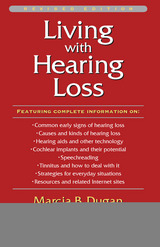
Living with Hearing Loss also suggests strategies for everyday situations and times of emergency. Chapters on speechreading, oral interpreters, assertive communication, and other tips for improving communication can enable people with hearing loss to make changes at work, home, and while traveling to cope with most situations. It can raise significantly the quality of the lives of hard of hearing people while also helping them to avoid dependency upon others.
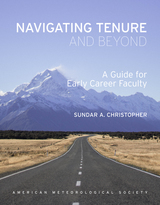
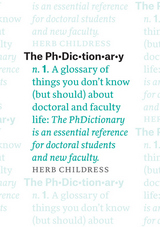
With more than two decades as a doctoral student, college teacher, and administrator, Herb Childress has tripped over almost every possible misunderstood term, run up against every arcane practice, and developed strategies to deal with them all. He combines current data and personal stories into memorable definitions of 150 key phrases and concepts graduate students will need to know (or pretend to know) as they navigate their academic careers. From ABD to white paper—and with buyout, FERPA, gray literature, and soft money in between—each entry contains a helpful definition and plenty of relevant advice. Wry and knowledgeable, Childress is the perfect guide for anyone hoping to scale the ivory tower.
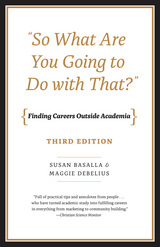
In this third edition of “So What Are You Going to Do with That?”, thoroughly revised with new advice for students in the sciences, Susan Basalla and Maggie Debelius—PhDs themselves—answer all those questions with a resounding “Yes!” A witty, accessible guide full of concrete advice for anyone contemplating the jump from scholarship to the outside world, “So What Are You Going to Do with That?” covers topics ranging from career counseling to interview etiquette to how to translate skills learned in the academy into terms an employer can understand and appreciate. Packed with examples and stories from real people who have successfully made this daunting—but potentially rewarding—transition, and written with a deep understanding of both the joys and difficulties of the academic life, this fully updated guide will be indispensable for any graduate student or professor who has ever glanced at his or her CV, flipped through the want ads, and wondered, “What if?”
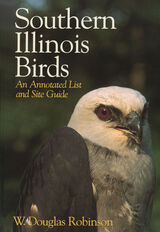
Designed to help bird watchers in the field and at home discover the significance of their observations, Southern Illinois Birds documents current knowledge of the birds of southern Illinois by surveying both the published literature on the subject and the unpublished field notes of active observers summarizing many important observations that are not readily available elsewhere.
Bordered on three sides by major rivers, with both upland and lowland forests and dramatic topographic relief in the unglaciated Shawnee Hills, southern Illinois offers a wide variety of habitats and birds unusual to Illinois and the Midwest in general. Compared with studies in central and northern Illinois, there have been few active field observers in the south; yet the contributions of those who worked in southern Illinois have been considerable. Robinson displays their efforts convincingly in this book.
Southern Illinois Birds includes information on early arrival and late departure dates of migrants, the highest reported single-day counts in each season, and records of all vagrants. In addition, Robinson includes maps and guides to some of the best birding areas in the region to encourage birders and others to explore the many birding and scenic attractions in southern Illinois.
Robinson has produced a definitive reference for ornithologists and amateur bird watchers, conservation and government agencies, college students in biology, and future researchers who wish to determine the status and abundance of southern Illinois birds.
READERS
Browse our collection.
PUBLISHERS
See BiblioVault's publisher services.
STUDENT SERVICES
Files for college accessibility offices.
UChicago Accessibility Resources
home | accessibility | search | about | contact us
BiblioVault ® 2001 - 2024
The University of Chicago Press









